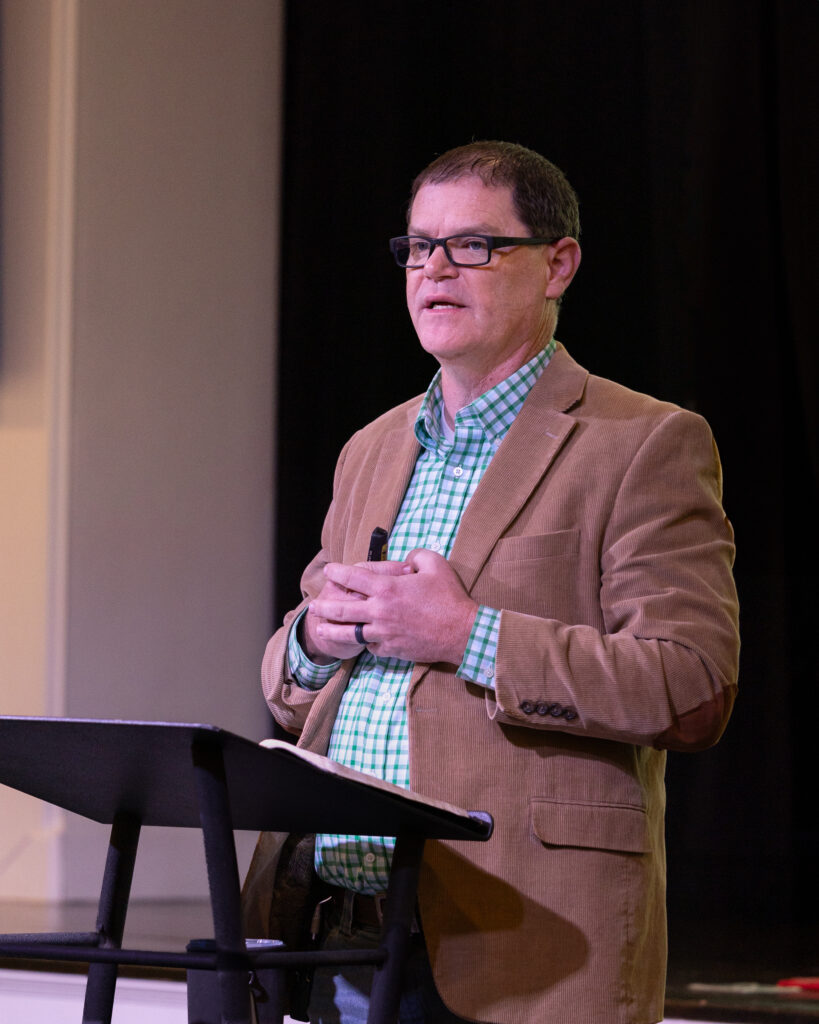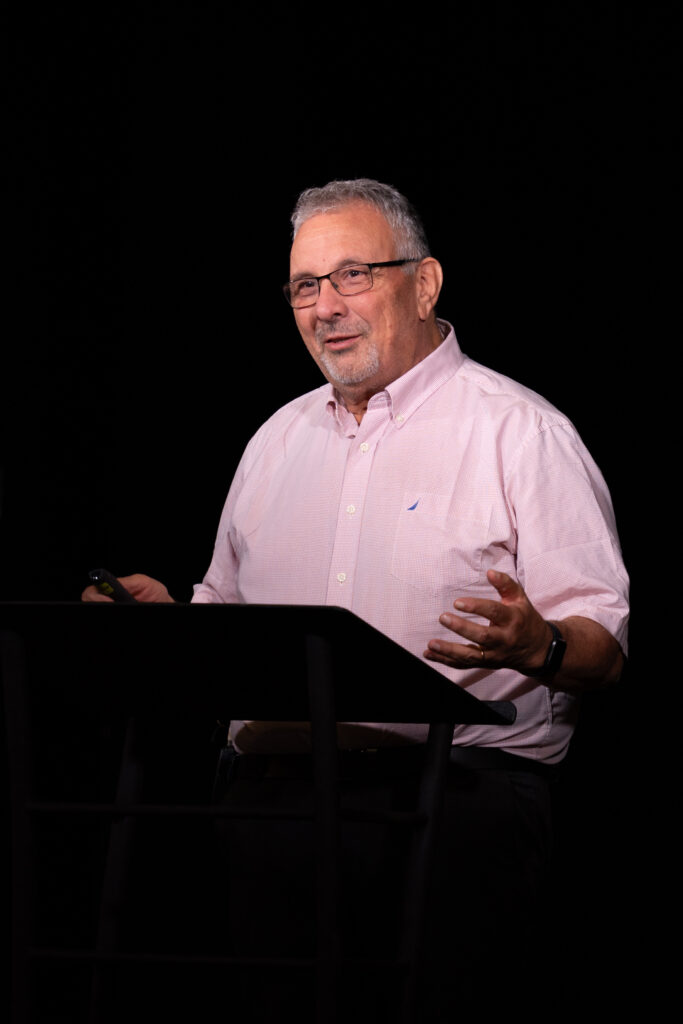Criswell College and the Israeli-Palestinian Conflict
At Criswell College, we recognize the complexities of the Israeli-Palestinian conflict. In response, we have engaged in numerous discussions involving students who have traveled to Israel and the West Bank amid the ongoing hostilities. We have hosted Israelis and Palestinians at the College who have graciously shared their perspectives and shed light on the challenges of being faithful to Christ in the midst of conflict.
 Dr. Scott Bridger, Professor of Global Studies and World Religions, delivered an insightful message during one of our Wednesday chapels on the Israeli-Palestinian conflict, urging students, staff, and faculty to approach the issue with humility and care. His opening remark set the tone: “This topic elicits strong emotions, strong convictions, strong opinions, and concerns,” emphasizing the importance of adopting a Christlike posture in discussions. Bridger referenced Philippians 2, noting that Jesus “emptied himself, taking the form of a servant,” as a model for engaging in complex issues with humility.
Dr. Scott Bridger, Professor of Global Studies and World Religions, delivered an insightful message during one of our Wednesday chapels on the Israeli-Palestinian conflict, urging students, staff, and faculty to approach the issue with humility and care. His opening remark set the tone: “This topic elicits strong emotions, strong convictions, strong opinions, and concerns,” emphasizing the importance of adopting a Christlike posture in discussions. Bridger referenced Philippians 2, noting that Jesus “emptied himself, taking the form of a servant,” as a model for engaging in complex issues with humility.
Bridger highlighted the problem of misinformation surrounding the ongoing conflict. He cautioned against rhetoric that oversimplifies the matter, urging believers to avoid using the Bible to justify extreme positions. “Some will use the Bible to vilify those who try to be nuanced,” he said, stressing the need for a balanced understanding.
One key point he addressed was the common Christian misconception that the conflict between Israel and Palestine is rooted in the biblical story of Ishmael and Isaac. Dr. Bridger dismantled this idea, explaining that God’s promise to bless Ishmael and his descendants (Genesis 17-21) contradicts the notion of a perpetual curse on Ishmael’s lineage. He stated, “Framing the Israeli-Palestinian conflict as a millennia-old battle between cousins or blood brothers is an Islamic narrative, not a Christian one.” Indeed, the issue of ethnicity, culture, language, and religion is much more complex than this simplified narrative presupposes. For example, some Palestinians have Jewish lineage, and some Israeli Jews have a non-Jewish lineage.
Bridger also explored the modern implications of misinterpreting biblical texts to support political stances. He warned against projecting biblical references to “Israel” onto the modern country, stating, “We need to be careful of jumping from the ‘Israel’ mentioned in Scripture to the modern State of Israel.” He urged Christians to recognize that the greatest way to bless Jews and Israelis is to point them to Christ. In Galatians 3:7, Paul explains that all those who have faith in Jesus are the true offspring of Abraham (cf. Gal 3:28).
Addressing both Israeli and Palestinian perspectives, Bridger emphasized the importance of standing with people as image-bearers rather than aligning strictly with political entities. He stated, “I stand with Israelis and I stand with Palestinians—pro-people and obedient to Jesus’ commands to love neighbors and enemies alike.” While not dismissing the serious issues separating the two sides, Bridger warned that standing with one side at the expense of the other often dehumanizes people, creating further division, which is not in the interest of either Israelis or Palestinians.
Bridger concluded by discussing the role of Christian witness in the region. He noted that unconditional support for Israel or Palestine, without promoting faith in Jesus––the Prince of Peace––as the solution, ultimately harms both groups. “Christians need to strike a balance,” he said, “calling both Israelis and Palestinians to repentance and faith in Jesus as Messiah.”
His closing message was clear: “Those of us who know the Prince of Peace must point them to Him,” pinpointing the ultimate Christian responsibility in such a deeply rooted and emotional conflict.
Each year, Criswell students have the unique experience of participating in a Global Learning and Service project in Israel as part of the Criswell 360°, our common student experience. Although the turmoil in Israel is prevalent, we believe it is imperative for students to experience firsthand the significance of both Scripture and the diverse contemporary cultural perspectives. This past summer, students encountered both the Holy Land’s historic significance and its current, intense struggles. Reflecting on the experience, students expressed how it redefined their understanding of faith and resilience. One student remarked, “You get to actually step foot on the Holy Land … it brings everything that we learned to life,” speaking of their visit to the Garden of Gethsemane and the Via Dolorosa, where they felt a deep connection to the life and sacrifice of Christ.
The group met with Messianic Israeli Jews at a Hebrew-speaking congregation, Israeli university students, and Palestinian Christians in Bethlehem who shared their unique perspective as a “minority of a minority.” These encounters offered students new insights into the daily challenges of living in a divided land.
One takeaway was realizing that their purpose extended beyond visiting historical sites; the students joined local believers in becoming what Dr. Bridger, called “living stones”—ambassadors for Christ in the present-day Holy Land. Through service projects, they engaged with local high school students who shared different perspectives on faith and culture, and were afforded the opportunity to share about their source of hope. The students also felt called and burdened to bring back these stories, becoming a voice for the new friends they made in the Holy Land.
The trip reinforced the students’ desire to be peacemakers in a world often filled with division, focusing on unity and compassion over taking sides. In a prayerful closing, students shared their hopes for a future shaped by the love and peace of Christ, demonstrating their commitment to be, as Rasha Saba, who leads the Fellowship of Christian Students in Israel, phrased it, “salt and light in the land.” This experience left them not only with cherished memories but a renewed mission to live out their faith with humility and courage.
 Rev. Azar Ajaj, president of Nazareth Evangelical College, was born and raised in Nazareth, Israel, and has served his Arab Israeli community for over 25 years. An ordained Baptist minister, Azar’s ministry has encompassed roles as pastor of the Local Baptist Church in Nazareth, executive with the United Bible Society, and General Secretary of the International Fellowship of Evangelical Students in Israel. During a Criswell Chapel, Criswell College had the privilege to hear from and talk to Rev. Ajaj. He reflected on the challenges Christians face amid ongoing regional conflicts, grounding his thoughts in biblical wisdom.
Rev. Azar Ajaj, president of Nazareth Evangelical College, was born and raised in Nazareth, Israel, and has served his Arab Israeli community for over 25 years. An ordained Baptist minister, Azar’s ministry has encompassed roles as pastor of the Local Baptist Church in Nazareth, executive with the United Bible Society, and General Secretary of the International Fellowship of Evangelical Students in Israel. During a Criswell Chapel, Criswell College had the privilege to hear from and talk to Rev. Ajaj. He reflected on the challenges Christians face amid ongoing regional conflicts, grounding his thoughts in biblical wisdom.
Acknowledging the complexity of the Middle East conflict, Rev. Ajaj remarked, “This conflict…has different elements. It has its ethnic element, its political element, its religious element.” He emphasized that these elements existed in the time of Jesus, pointing to the story of Jesus and the Samaritan woman as a model for navigating division. “Jesus insisted on crossing each barrier she put in front of him,” he explained, noting how Jesus bypassed social, political, and religious divides to reach out to this woman. Ajaj encouraged his listeners to consider “what barriers we need to cross” in their communities, reflecting Jesus’ willingness to go against cultural norms to reach others.
Rev. Ajaj stressed the importance of viewing everyone as “created in the image of God,” urging Christians to resist divisions based on ethnicity or background. “Jesus was not interested in such a barrier,” he observed, emphasizing that Jesus’ interactions focused on shared humanity over enmity. The biblical call, he added, is to extend God’s love beyond physical boundaries and social divides, bringing people together under a shared faith in Christ. In the context of his ministry in Israel, he noted, “We do not have enemies. Our enemy is evil; Satan is only our enemy.” His message was an imperative to a commitment to bridge gaps between Jews, Muslims, and Christians, striving to show them God’s love and hope.
Currently, Rev. Ajaj is pursuing his Ph.D., researching the history of Baptists in Israel, while continuing to lead and teach as President of Nazareth Evangelical College. He and his wife, Ibtisam, have been married for 32 years and are parents to three sons.
As our Criswell community reflects on these conversations, it is imperative that we continue to seek a deep understanding fortified by a biblical perspective, considering how Jesus would approach the Israeli-Palestinian conflict. Above all, Criswell College will persist in prayer as we grow in our understanding and love for those suffering in Israel, the West Bank, and Gaza.
Further discussion:
Coffee with Creamer | The Reign of The Prince of Peace
Dr. Barry Creamer, president of Criswell College, speaks about the Israel-Hamas conflict with Dr. Scott Bridger, Dr. Sarah Spring, and student Jenna Coombs, who spent time in Israel and Palestine recently as part of Criswell College’s Global Learning and Service Experience. The conversation hinges on how meeting human beings changes our engagement with the affairs affecting them.